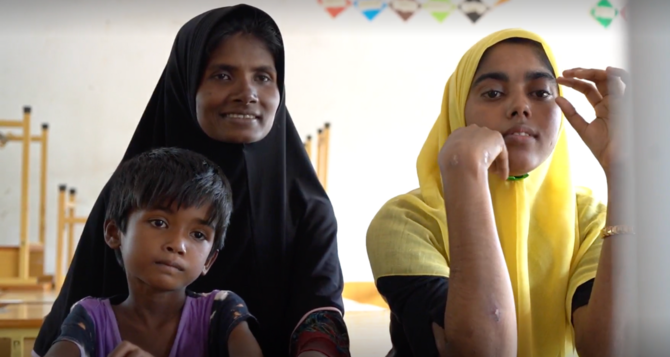JAKARTA/DHAKA: When Hatemon Nesa boarded a wooden ship in Cox’s Bazar in late November, she left a Rohingya refugee camp in Bangladesh in the hope of finding a better life for her young daughters.
She set out on her journey with her five-year-old, leaving the older daughter with family members at the camp. She believed that the voyage would be successful and that they would soon be reunited in another country.
But the boat engines broke down about a week later and she, her daughter and another 172 refugees, mostly women and children, were left drifting in the Andaman Sea for weeks, with no food or water.
No regional country intervened despite UN calls for rescue last week. They were finally brought to safety by fishermen when their boat entered Indonesian waters.
On Wednesday, efforts of an Arab News team helped reconnect Nesa with her family, who had not been able to reach her for weeks and feared the worst.
“Allah almighty saved our lives,” Nesa said in a video call from a shelter in Indonesia’s northern Aceh province, as she spoke to her brother and mother who remained in Cox’s Bazar.
“We were starving while floating on the boat ... I couldn't eat anything. If I held a water bottle in hand, it would have been stolen. I could drink water only when there was rain.”
Nesa and her daughter, Umme Salima, were among the refugees who reached the coastal village of Muara Tiga in Aceh’s Pidie district on Monday.
The International Organization for Migration said they were in “very poor health condition” and many were suffering severe dehydration and malnutrition.
“The rice and lentil you fed me, with that energy I traveled up to Indonesia,” Nesa told her mother as both burst into tears during the call.
Whenever there was another ship in sight, she and other refugees on the boat would scream for help. But for weeks their cries fell on deaf ears.
“We shouted so much and waved our hands like anything. At one point it felt like our hands would fall off our bodies,” Nesa said.
Her relative, Rahena, 19, who was also on the boat, recalled how they were floating for days. “The cries of children due to hunger were unbearable,” she said, adding that at least 20 people onboard had died.
No help came when their boat entered Malaysian waters earlier this month. Neither did any come when it crossed into Indian waters, despite Nesa’s brother Mohammed Rezuwan Khan, a Rohingya activist in Cox’s Bazar, appealing for rescue.
As the drifting Rohingya entered Indonesian territory, authorities repeatedly said they could not locate their boat. Local villagers then caught sight of them and organized help.
“From what I’ve seen, the eagerness of the public (to help) is extraordinary,” Nasruddin, coordinator from Geutanyoe Foundation, an Aceh-based humanitarian organization, told Arab News. “This is something that we need to appreciate and commend.”
It was not the first time that Indonesian fishermen would join to help the refugees, taking them to safety and providing necessary assistance.
Nasruddin said around 600 Rohingya have reached Aceh since March this year.
Nesa and her little daughter’s journey is not over as Indonesia is not a party to the 1951 Refugee Convention, meaning they cannot claim asylum. For the time being, however, they are safe and again in touch with their family.
“With the help of Arab News I got hold of my sister again and established communications with her after landing in Indonesia,” her brother said. “I want to convey my heartfelt thanks.”



























